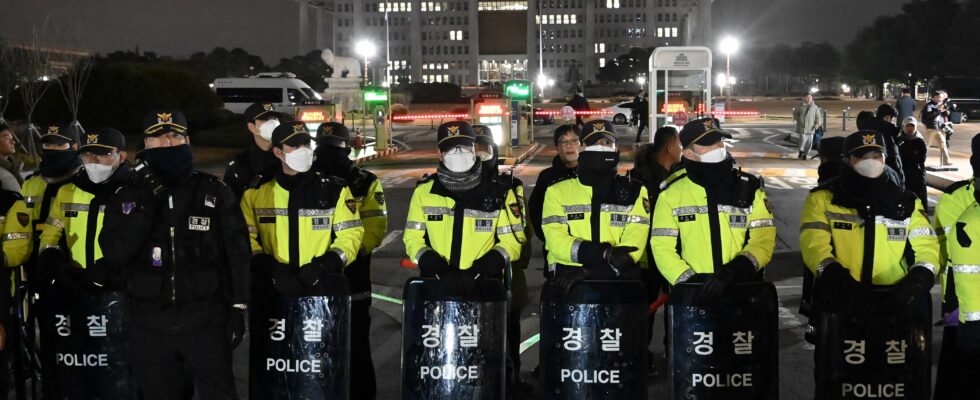An announcement made to the surprise of an entire country. South Korean President Yoon Suk Yeol proclaimed martial law on Tuesday, December 3, in the context of a heated parliamentary debate on the budget. A measure he described as necessary to protect the country from “North Korean communist forces”, but immediately deemed “illegal” by the opposition leader who called on the population to demonstrate.
“To protect liberal South Korea from the threats posed by North Korean communist forces and eliminate elements hostile to the state (…), I declare emergency martial law,” the president declared live in a surprise televised speech. “Without concern for the livelihood of the people, the opposition party has paralyzed the government, for the purposes of impeachments, special investigations and to protect its leader from legal prosecution,” he continued.
An “inevitable” decision
It’s hard not to see behind this announcement an offensive against the parliamentary opposition, much more than North Korea. All political activities were banned on Tuesday, and the media are placed under government surveillance, army chief Park An-su said in a statement. Helicopters landed on the roof of the parliament building in Seoul, according to live footage broadcast by television channels.
South Korean opposition leader Lee Jae-myung called martial law “illegal” and called on people to gather outside parliament in protest. “President Yoon Suk Yeol’s illegal imposition of martial law is invalid,” said the man who narrowly lost to Yoon in the 2022 elections. “Come to the National Assembly now. I am going there also,” he added. Even the leader of the presidential party in the South Korean Parliament affirmed that “the declaration of martial law by the president is wrong”, and that “we will end it with the people
Hundreds of people heard this call and began to flock to Parliament around 1 a.m., according to television images. “Open the door, please. Your job is to protect the National Assembly. Why do you stand idly by while MPs are trampled?” a man shouted at a group of police guarding the doors of the building placed under seal. Members of South Korean special forces were trying to enter Parliament at the same time, according to television.
The United States and the United Kingdom said they were “monitoring the situation closely,” while China called on its fellow citizens in South Korea to exercise “caution.”
An “inevitable” decision
This decision by the South Korean president comes as his party, “The People Power Party”, continues to battle with the main opposition party, the Democratic Party, over next year’s proposed budget. And opposition deputies approved last week, through a committee, a considerably reduced budget program. “Our National Assembly has become a haven for criminals, a den of legislative dictatorship that seeks to paralyze the administrative and judicial systems and overthrow our liberal democratic order,” said South Korean President Yoon.
He accused opposition elected officials of cutting “all budgets essential to the nation’s primary functions, which are the fight against drug-related crimes and the maintenance of public security.” […] transforming the country into a drug haven and a place of chaos for public security.” Yoon Suk Yeol went on to call the opposition, which holds a majority in Parliament, “forces hostile to the state with the intention to overthrow the regime”. He assured that his decision was “inevitable”. “I will restore normality in the country by getting rid of these forces hostile to the State as soon as possible”, added the South Korean president.
The first establishment since 1981
Martial law had not been imposed in South Korea since the democratization process that began in the late 1980s, including periods of high tension, such as in 2016, when millions of demonstrators obtained the dismissal of the President Park Geun-Hye, amid a corruption scandal.
It was last decreed on May 17, 1980, during the military coup of General Chun Doo-hwan. The next day, hundreds of thousands of people took to the streets of Gwangju, a traditional center of protest, to protest against the coup. Chun Doo-hwan wanted to fill the power vacuum after the assassination of dictator Park Chung-hee. The demonstrations were repressed in a bloodbath, before martial law was finally lifted in January 1981.
